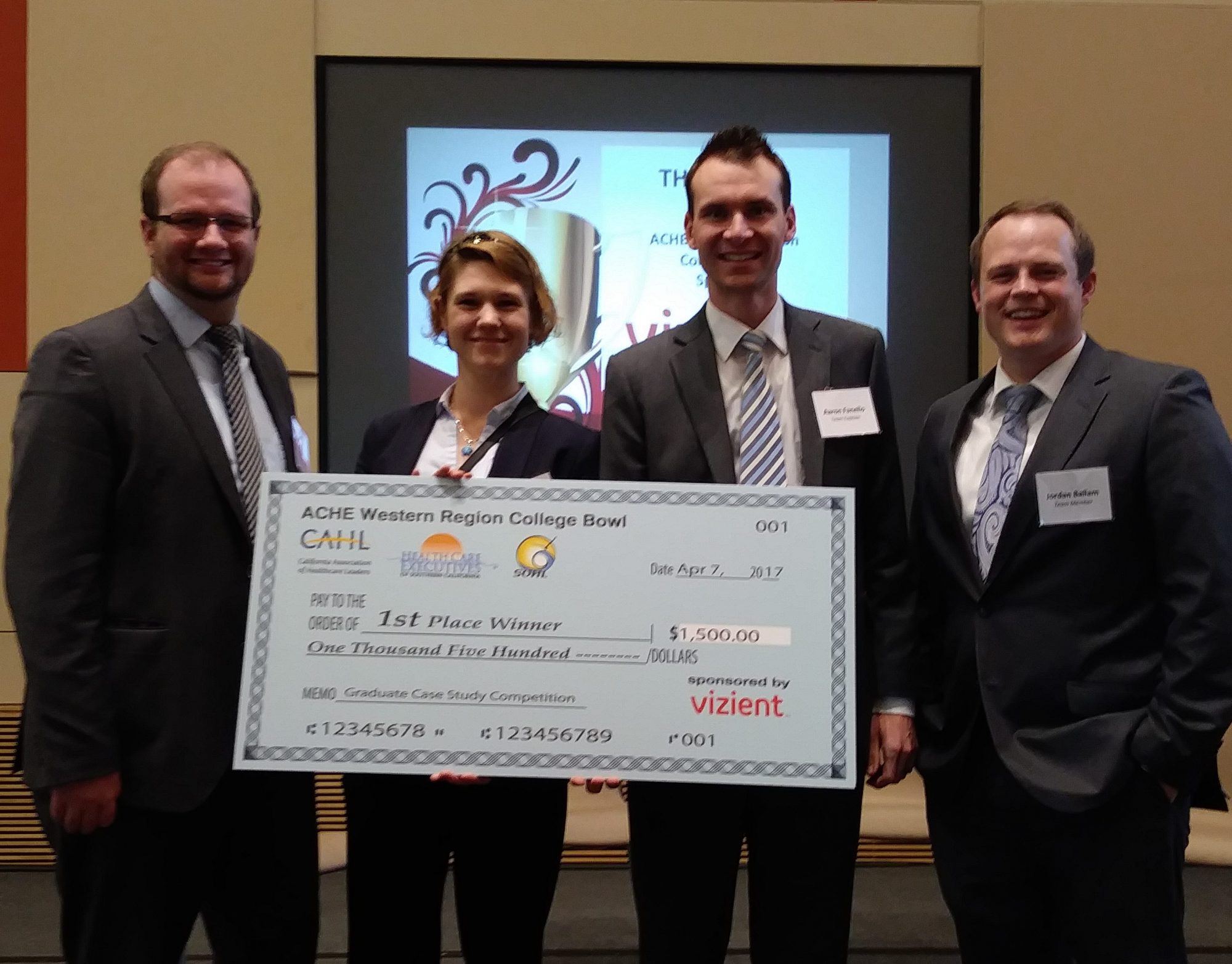(Show at top: Jeff Spear, Amanda Snyder, Aaron Fanello, Jordan Ballam)
In 2017, the David Eccles School of Business MHA program sent four students to the American College of Healthcare Executives Western Regional Case Competition. The competition featured 12 schools from across Arizona, California, Nevada and Utah, and was held in Los Angeles. MHA students Aaron Fanello, Amanda Snyder, Jeff Spear and myself, Jordan Ballam, represented the Eccles School, competing in both preliminary and finals rounds, and ultimately winning the first place trophy and cash prize of $1500. Our team beat the two-time reigning champs at UCLA.
Although I facetiously told our team in our first meeting that we would be taking home the first place prize, I was hesitant about the fact that none of us had previously competed in a healthcare case competition. However, despite our lack of competition experience, each of the team members brought a unique skill set to the team. Between the four of us, we had clinical background in both behavioral health and urgent care, along with strong financial and clinical analytical ability. As a team we were not allowed to consult directly with local professionals on the development of our strategy recommendations, but we did spend time discussing how we would transition between team members. We even spent time with a professional working on our presentation skills. Once the case arrived, we had one week to develop a strategy and learn as much as we could about the Children’s Hospital of Orange County. Interestingly, the case did not present a major problem to address, but rather the challenge was how to maintain the system’s relatively positive growth experienced over the last several years.
After hours of presenting in front of our spouses, Aaron’s living room, our bathroom mirrors and our rear view mirrors as we drove home from work, we felt confident with our presentation and slideshow. The first round of the competition split the 12 teams into two groups of six teams. Each team was given 15 minutes to present, followed by a short question session in front of a large panel of local healthcare leaders. The teams with the top two scores from each subgroup moved on to participate in the final round. Although the names of the schools represented by each team were kept confidential, a judge mentioned to me afterward, “It was pretty easy to tell that you were the only team from Utah. You all were much too pale to have been going to school in California.”
After being announced as one of four schools to advance to the final round, we were randomly selected as the first team to present. We were taken into a room and given additional information about the case as well as five minutes to prepare. Essentially, we had been given $100 million dollars, and we had to make a recommendation to the chief operating officer of CHOC Children’s (who was actually in attendance) along with several hundred other people about what to do with this money. When the winners were announced, we were ecstatic to learn that we had won the competition in our very first year of participation. The cherry-on-top for me was being presented a check the size of a card table. I’ve always dreamed of accepting a giant check. I’ve since checked that off on my bucket list.
Although participants indicated that they were disappointed to see the state of Utah swoop first place in a competition traditionally dominated by California teams, they were encouraged and driven by our success. A few teams mentioned it was nice to see the University of Utah has a high-caliber program and that they are planning to return and compete against us next year.
I can speak for our team in saying that we felt a great deal of pride to be held in high esteem by the likes of UCLA, USC, Arizona and other highly acclaimed programs. The competition was exciting and rewarding itself, but, as I think back to the results, I realize that two things in particular stuck out as most valuable. First, each of us gained confidence in the quality of our education at the Eccles School and in our ability to impact a healthcare system for the better. Second, I’ve gained strong, wonderful connections with three incredible future healthcare leaders in Jeff, Aaron and Amanda that I’m confident will benefit me for years to come.







